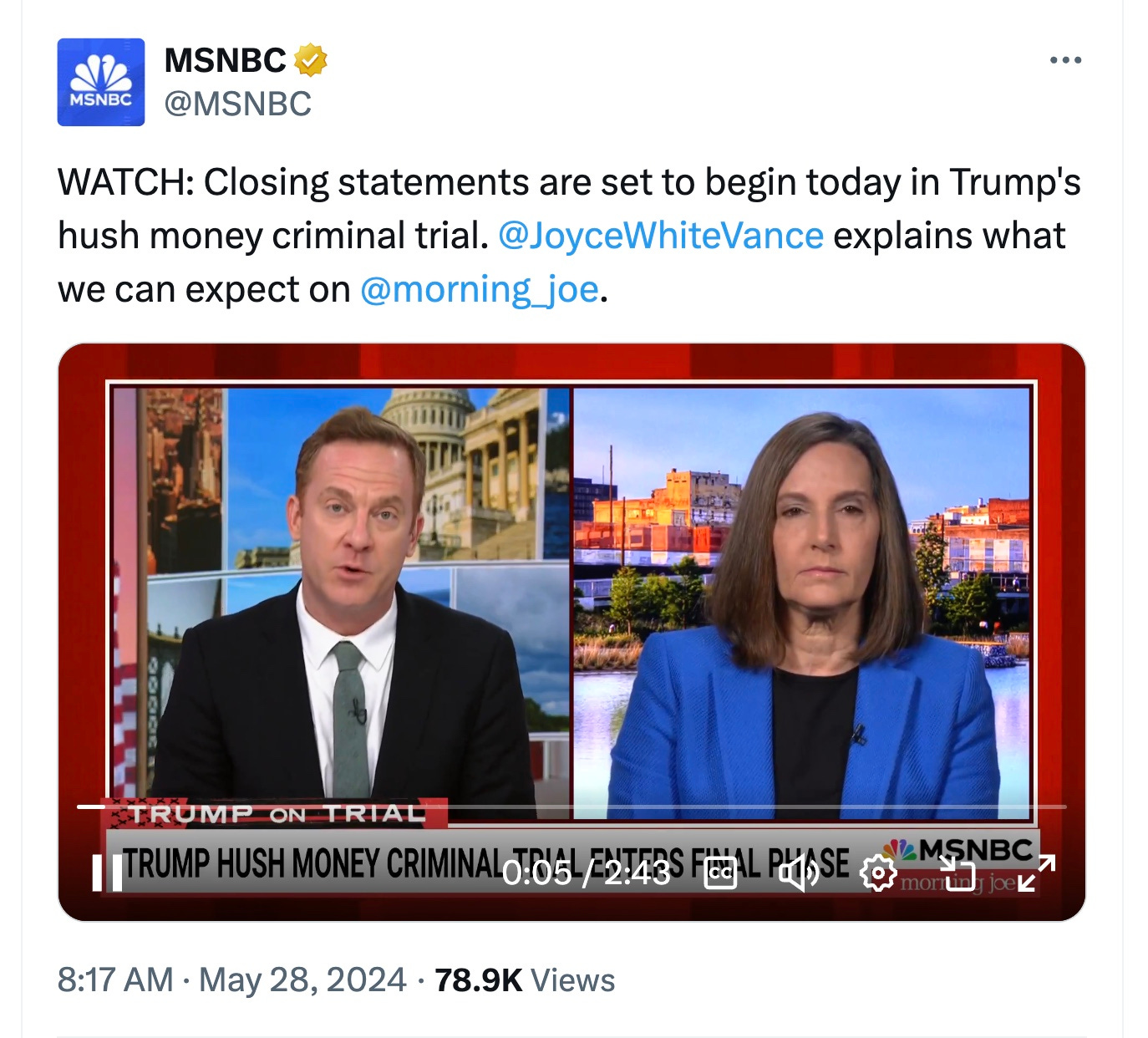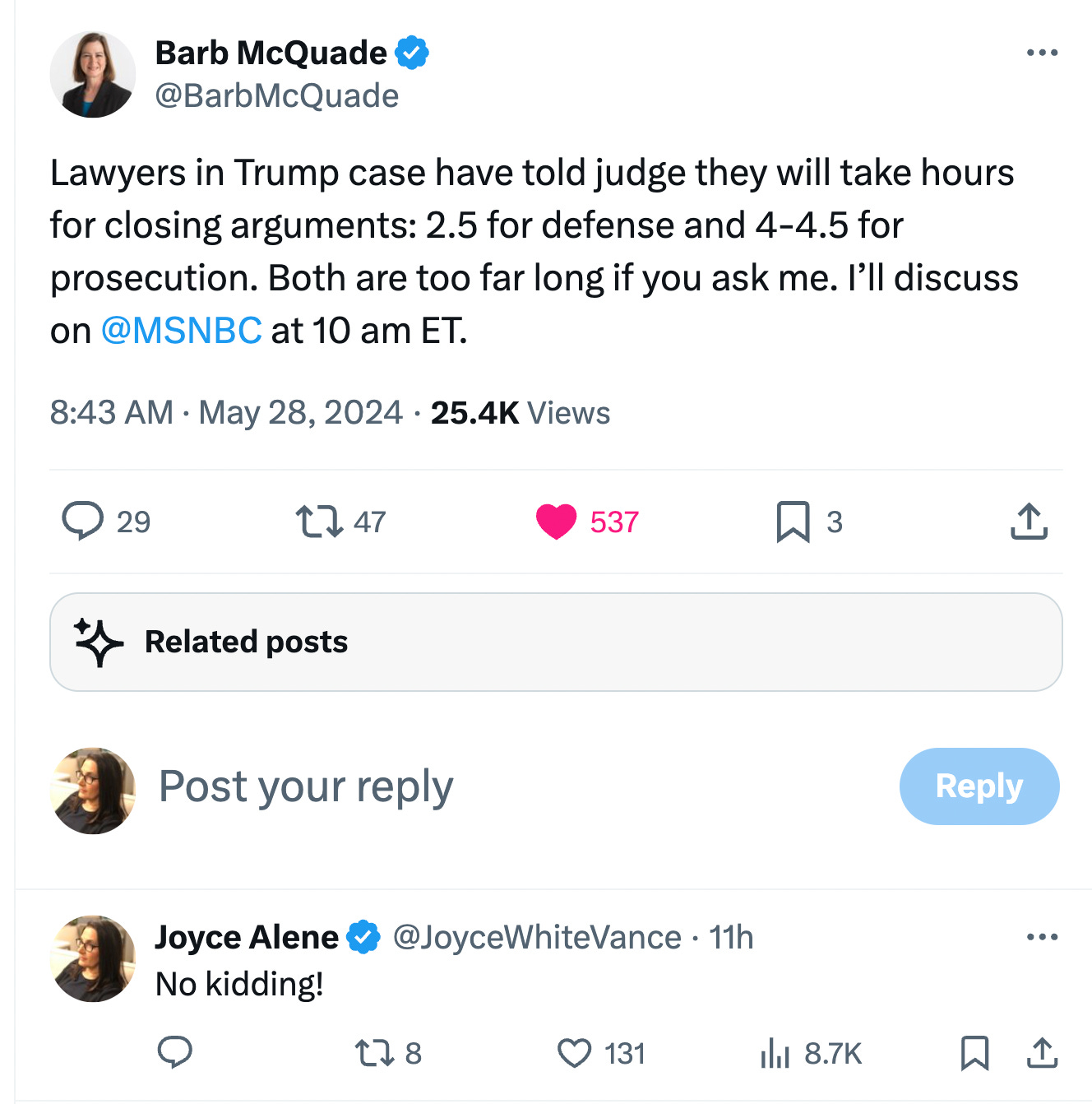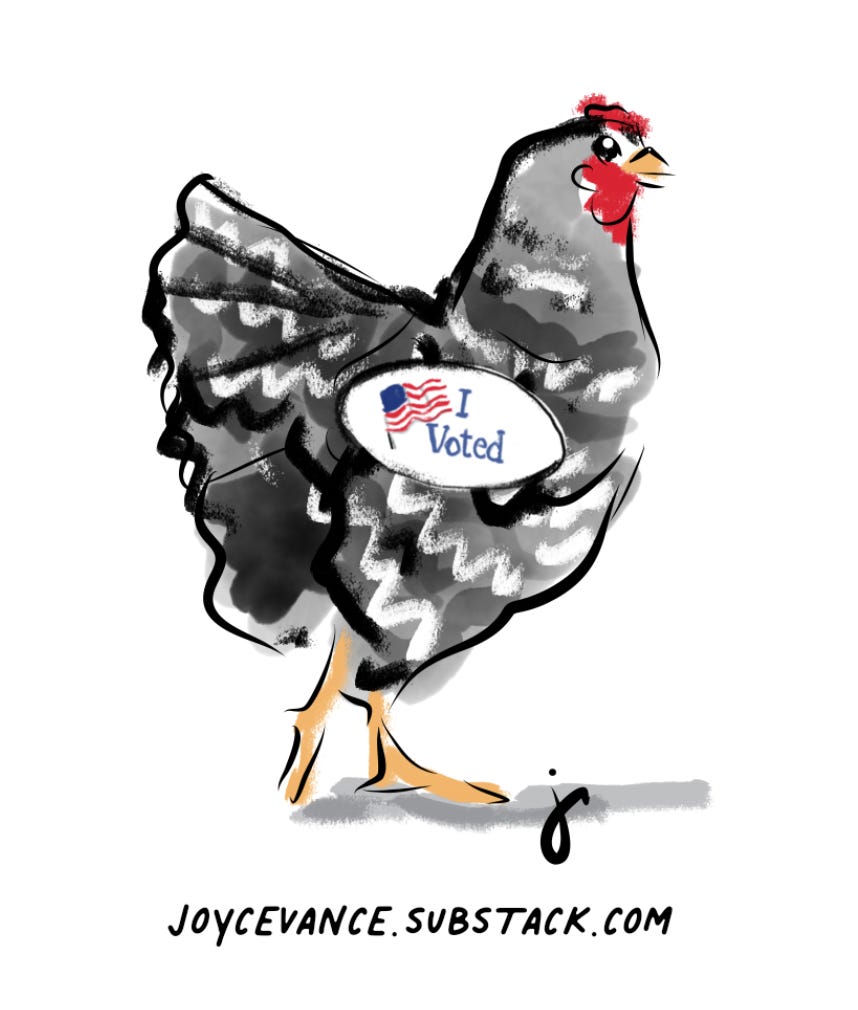Closing Arguments
Today was a reminder to me that sometimes, Mother Nature has different plans for us.
I was all geared up for closing arguments, lots of television, and a couple of podcasts. It turns out that after an early morning hit on Morning Joe, our internet went flaky.
I ended up spending much of the day finagling tech. For those of you who listen to Preet Bharara’s (my former U.S. Attorney colleague in the Southern District of New York) and my Cafe Insider Podcast, I taped the second half in my car on our podcast app—God bless Subaru wireless—under a blanket to muffle sound.
All of that to say that while I had planned two posts for you tonight, one focusing on closing argument by the defense and one on closing argument for the prosecution, instead, I’m going to give you a more streamlined take on what turned out to be an extremely long, some would say too long, day.
Realistically, it’s impossible to recap and score every point that was made in seven-plus hours of summation. And regrettably, there was no way to watch it or listen in in real-time. You can read the transcript once it becomes available on the New York State Court website. But again, and I know I am repeating myself, for a case like this, video, or at least audio, should have been available to the public. A very limited number of people were able to get into the courtroom, as we saw from people paying line standers $50 an hour to queue up and hold a place for them as early as last Thursday ahead of a Tuesday argument. Access to the courts shouldn’t be limited to those with the time, position, and money to be there. Reading it on the page just doesn't give you the full understanding of how it landed in the courtroom, and that's something we should have all had access to.
In any event, after the Judge instructs the jury on the law tomorrow morning, the case will be in their hands to decide. We don’t know how long it will take them, what sort of questions and conclusions are already formed in their individual minds, or whether there is one or more jurors who are partisans, substituting politics for law. Reports in the courtroom are that even today, with the lengthy arguments, jurors have been engaged and attentive. I wrote a piece at the start of trial about my faith in the jury process:
After 25 years of service as a federal prosecutor, I continue to have confidence in the jury system. The Manhattan DA’s case against Trump is a complicated one, based in some important regards on circumstantial evidence. The jury will have to decide whether to believe it. They will also have to decide which witnesses they believe, and, in order to convict on felony charges, they will have to agree that the prosecution has established that the false business records were created to conceal or assist in the commission of another crime. This is why we have a jury system — when cases are obvious or easy, they typically resolve with a plea agreement. When there is a dispute over the facts, someone has to decide where the truth lies and whether a guilty verdict is warranted. We could leave questions of guilt in the hands of a judge, or a king, or his star chamber. We do not. We entrust the lives and liberties of people who are accused of crimes in this country to the collective wisdom of juries.
Each table of lawyers had an assignment today in the courtroom. For Trump’s lawyers, it was to poke holes in the government’s case and to create reasonable doubt. For the prosecution, it was to establish proof of guilt beyond reasonable doubt. The defense went first, with lawyer Todd Blanche arguing that there were three areas where the government’s proof failed:
The documents Trump is charged with aren't fraudulent; they were legitimate records regarding legal services Michael Cohen was retained to provide, so no crime occurred.
Trump lacked the intent to commit a crime; he was too busy running the country.
You can't believe Michael Cohen, and without him, there isn’t enough evidence to convict.
A key problem for the defense was the failure to confront, in a meaningful way, the government’s two powerful exhibits, numbers 35 and 36. Thirty-five shows, in Allen Weisselberg’s handwriting on a wire record of the payment to Stormy Daniels, the “gross up” of the amount to be repaid to Cohen. Thirty-six shows controller Jeffrey McConney’s notes explicitly reflecting the need to cover the amount to pay taxes.
Why would Cohen and Weisselberg have done this without Trump’s authorization? The defense failed to come up with a compelling explanation. Trump is cheap, as Cohen, who was charged with negotiating his debts down, was well aware. Why would he have put his family home up as the stake to rescue Trump without guarantees he’d be paid back? Multiple witnesses testified Trump scrutinized every transaction, and Hope Hicks testified Cohen wasn’t the kind of person who did anything without an expectation of a return for him. This was the prosecution’s linchpin evidence, and the defense didn’t offer the jury a good reason to reject it.
Even when it came to hammering home problems with Michael Cohen’s trustworthiness, it was predictable and conclusory, rather than a summary recitation of Cohen’s important lies. At one point Blanche suggested he didn’t know how many lies would be enough. The prosecution, on the other hand, explained Cohen had lied—for Trump—until his family was exposed, at which point he began to cooperate and has since truthfully testified. Will the jury buy that? Michael Cohen is no choir boy, as prosecutors readily conceded. “We didn’t pick Cohen up at the witness store,” they told the jury, pointing out that Cohen lied for Trump; that, in fact, Trump chose Cohen for precisely the same traits that they now want the jury to disbelieve him over.
Many people thought the defense scored a hit on Michael Cohen in cross-examination when they dug out text messages showing he was concerned about a 14-year-old prankster calling him and called Trump bodyguard Keith Schiller about that, instead of, as Cohen testified, calling Schiller to have him hand the phone to Trump so Cohen could confirm that the payment to Stormy Daniels was complete. Prosecutors were able to show a picture of Schiller standing next to Trump just moments before that call was made during redirect. Today, prosecutors read jurors a mock-up of a conversation between Cohen and Schiller about the 14-year-old that progressed to Schiller passing the phone to Trump so Cohen could confirm the payment. It took under a minute—the call itself lasted about a minute and a half. The jury will get to decide who they believe.
One of the prosecution’s key themes was, don’t let them fool you. Use your common sense. This is an often-repeated prosecutorial theme with important usage here. Trump’s lawyers argued the release of the Access Hollywood Tape wasn’t that big of a deal to the Trump campaign, that Trump was innocent—he never had sex with Stormy Daniels; the records billing the payment to her as legal fees weren’t fraudulent. Juries don’t have to take silly speculation seriously, but sometimes, it’s important for prosecutors to point that out. They did here.
As he began his summation, prosecutor Joshua Steinglass reminded the jury that in opening statements, his colleague Matthew Colangelo told them that the case is about a conspiracy to corrupt the 2016 election and hide that conspiracy by concealing records of the payoff to Stormy Daniels in exchange for her silence.
Steinglass told the jury the People had to prove three things:
That there were false business records.
That the false business records were intended to cover up a conspiracy related to the 2016 election.
That Trump was involved in their creation.
Tomorrow morning the Judge will instruct the jury on the law. Those instructions are the rules that will govern deliberations. We have not seen those instructions yet, so tomorrow’s proceedings will be incredibly important and the final step before jurors can at long last sit down together and discuss the case.
But it likely comes down to this: Trump lawyer Todd Blanche told jurors today that they should want and expect more than Michael Cohen. Prosecutor Joshua Steinglass told them that was what they gave them. Now it’s about to be up to the jury. The verdict in the criminal case is their job. Whatever they decide, our job continues to be looking ahead to November. We have an election to win and a terminally unsuitable candidate to keep out of office.
We’re in this together,
Joyce
.





“We didn’t pick Cohen up at the witness store”. The mental picture of prosecutors with a grocery cart , end caps and daily specials as well as perhaps coupons is priceless.
I can hardly wait for your comments in the jury instructions. As always, you cut through the weeds for us. Would that your chickens could vote…
“Von trump was too busy running the country” ? If I remember well His Orange Disgusting Lordship was spending much more time playing golf around than dealing with files / meetings / briefings etc in the white house. Lol